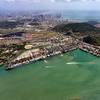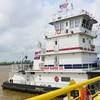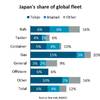Castrol GreenField Takes Environmental Lead
GreenField lubricants from Castrol Offshore are likely to remain the only products fully tested to environmentally-responsible standards set by Norwegian authorities through 2011.
Changes to Norwegian Activities Regulations introduced on January 1st 2010 require discharged lubricants and chemicals, used in closed systems in amounts of more than 3000kg a year per facility, to be registered for use offshore. Applications including crane hydraulics, thrusters, drilling system hydraulics and mooring winch gears, require Harmonised Offshore Chemicals Notification Format (HOCNF) registered products.
Castrol Offshore proactively registered its products before the January 1st 2010 deadline. Topside hydraulic fluid Castrol BioBar and thruster-specific Castrol BioStat have both been tested and registered according to the OSPAR (the Oslo and Paris Conventions for the protection of the marine environment of the North-East Atlantic) requirements on the Norwegian NEMS database.
The range is completed by Castrol Anvol CF22, formulated for BOP control systems, Castrol BioTac for jacking legs and deck machinery and Castrol BioTrans for gear boxes. All of these products are easy to retrofit.
Again, the Canadian government recently started asking offshore permit holders for information on the environmental specifications of thruster fluids. Currently, shipboard lubricants do not have to undergo the same rigorous environmental testing as those used offshore. However, for example, the final draft of the European Ecolabel for lubricants extends to lubricants in marine applications. Meanwhile, in the US, the US Environmental Protection Agency (EPA) is reviewing criteria in the Vessel General Permit for the selection of environmentally preferable lubricants for use in stern tubes and thrusters.
Similar guidelines have been provided by the International Maritime Organization for ships operating in Polar waters, which state: “Sterntube bearings, seals and main propulsion components located outside the hull should not leak pollutants. Non-toxic, biodegradable lubricants are not considered to be pollutants.”*
Source: Castrol Marine














